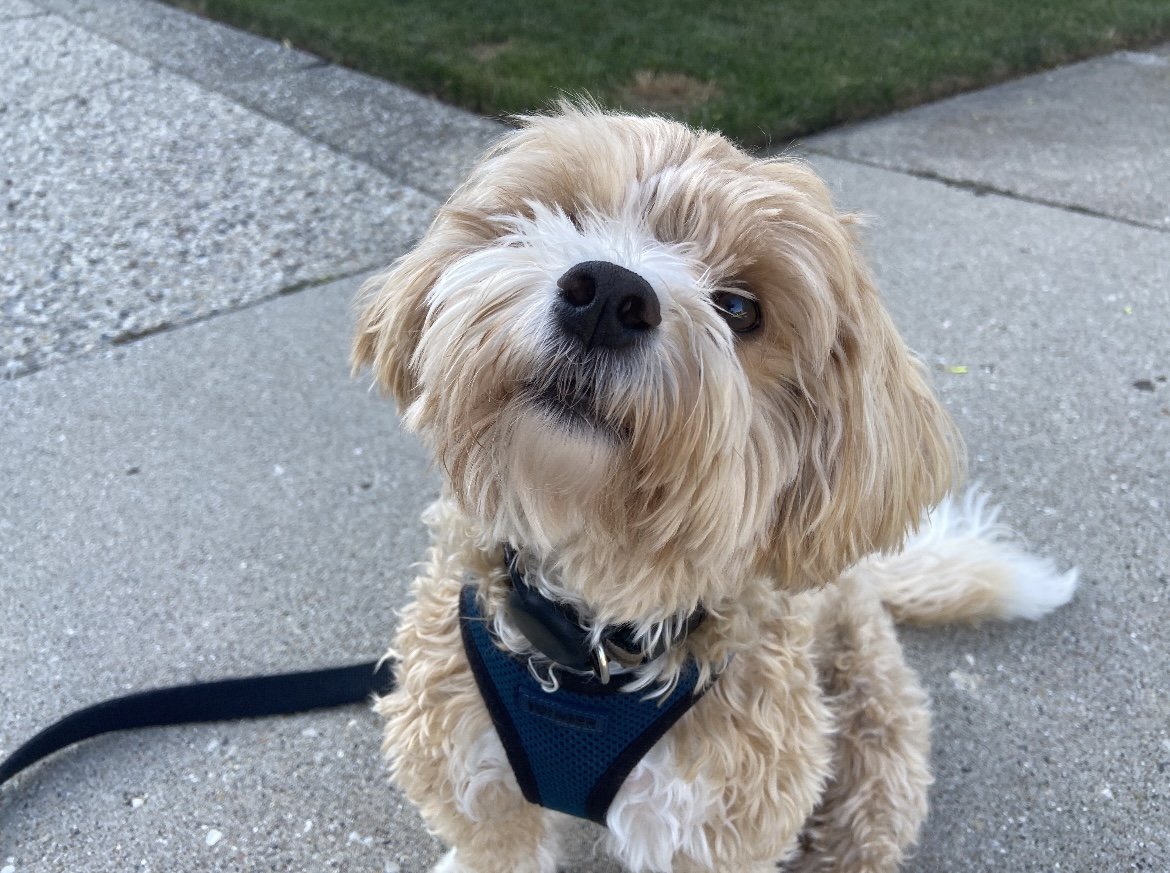For Eddie
How animals are good for our mental health
Written by Jessica Katz, Online Editor
Illustrated by Nicole Glesinger, Staff Graphic Artist
TW: Sexual assault and mental health
I got my puppy, Eddie, on March 12, 2020, right when the pandemic hit. He was my first dog, my first real pet. Little did I know he would save my life.
The pandemic was a rollercoaster for me when it came to mental health. I felt like I had lost myself, which really frightened me. I struggled with severe anxiety and panic attacks. I often felt isolated, confused, conflicted; I was at constant war with my mind, grappling to gain control.
Since March 2020, I’ve worked on myself and how to best take care of my mental health. I’ve gone to therapy, started journaling, but I dedicate most of my growth to my puppy. For me, it’s been comforting to have him by my side through all of my ups and downs.
There’s something about this dog that is so incredibly special. He has the biggest heart. My family gave him the middle name Joy because he really is a tiny fluffball of joy. When I get home and open my front door, he eagerly rushes towards me, wagging his tail and bobbing his head. Whether I’m hysterically crying on my bedroom floor or wrapped up in a blanket, sitting in silence, Eddie lays with me, giving me kisses and cuddles to show me love. He can truly sense when I’m struggling and wants to cheer me up.
It’s somewhat crazy to say, but I don’t think I’d be in a good place right now without my puppy. With him, I have this incredible bond, knowing that I give him all my love and he does the same in return. He’s shown me unconditional love, and for that, I am endlessly grateful.
Although research on human-animal interactions is relatively new, studies have shown that pets are good for our mental health. Interacting with animals can decrease levels of cortisol, a stress-related hormone (The Power of Pets, 2020). Animals can reduce loneliness, stress and anxiety while increasing feelings of social support and boosting our moods.
Animals can also help promote a healthy lifestyle. Even taking your dog for walks increases exercise and time spent outside. They provide companionship, add structure to your day and help you meet new people (Robinson, 2019).
Our pets tend to naturally focus their attention on us. According to Dr. Ann Berger, physician and researcher, “Dogs are very present. If someone is struggling with something, they know how to sit there and be loving.” Think about the foundations of mindfulness: attention, intention, compassion and awareness. While we learn mindfulness throughout our lives, animals do this innately. (The Power of Pets, 2020).
What is so special about human-animal relationships is while we love and care for our pets, they do the same for us.
This type of connection is what inspired the founding of EmBark, a national nonprofit with a chapter at UW-Madison. EmBark “was founded on the basis of the founders' love for animals and the seen positive effect animals impact on trauma and mental healing” (EmBark, 2021). The non-profit provides support, resources and services to survivors of child abuse, sexual assault, domestic violence and intimate partner violence as well as those who struggle with mental health issues.
According to co-founder Abby Moravec, “our mission is to give the same support that we got from our animals as survivors to other survivors.” One way EmBark supports survivors is through care packages, carefully crafted for each survivor and their animals. Survivors can request a care package on EmBark’s website.
Moravec referred to the organization as a “motherboard of resources,” a place survivors can go to for advice and in search of resources. “We want to be a place they can go to, where we’ll put in the work of … helping them through that process,” said Moravec.
Another passion of EmBark is animals. According to Moravec, the organization provides information on emotional support animal (EMA) certification and fundraises for animal adoption. So far, EmBark has funded four adoptions, including Sasha, Mr. Cat and Barry.
With the help of co-founders Abby Moravec, Sammy Michaels and Holly Muth, as well as members and supporters, EmBark has been highly influential in supporting survivors and rescue animals. Click here for more information or to donate to their cause.
Both Eddie and EmBark have proven to me the value of animals in our lives. To be quite honest, I never really wanted a dog growing up, but when I first saw Eddie at two weeks old, I knew I just had to bring him home with me. Almost two years later, Eddie has opened my life to a unique and rewarding relationship. Just like my story with Eddie, here are the stories of five girls and their furry friends.
Maya and Doobs:
Maya has struggled with both OCD and anxiety for a while, but her mental health worsened when she moved away from home. To help feel less homesick, Maya brought her 14-year-old family cat Lulu, nicknamed Doobs, to live with her in Madison.
“It’s been so nice having her here,” said Maya. “It feels like I have a little piece of home with me.”
Maya simply enjoys taking care of Doobs. While it’s a big responsibility to be a pet’s primary caregiver, she finds it rewarding to be an important part of Doobs’ life.
Doobs has brought a sense of ease to Maya’s busy college life. “She wakes me up at 7 a.m., but it’s worth it,” said Maya. “She’s such a comfort to me.”
Maddie and Winston:
Maddie has had her emotional support cat Winston for almost two years now. To her, it’s the simple things about her daily interactions with Winston that have helped her the most.
There are many days she doesn’t want to get out of bed in the morning—that’s where Winston comes in. Maddie feels motivated by Winston. She has to feed him, to take care of him. In turn, she’s motivated to take care of herself.
She added, “it feels good to have someone depend on me and care about me. … He follows me around everywhere, which is funny, but it makes me feel so important. I’m a person he loves.”
Maddie finds that just petting and interacting with Winston relieves her stress. “If I have a lot going on with school, sometimes I just stop and play with him or pet him,” said Maddie. “For a moment, it’s like everything is fine.”
Maggie and Sam:
Maggie got her mini golden doodle, Sam, when she was 12 years old. Sam has been one of Maggie’s main sources of support, especially when the COVID-19 pandemic hit.
Maggie’s family took the virus very seriously; she and her sister were not allowed to see people until they were fully vaccinated. Maggie spent a lot of time at home alone. “It was incredibly isolating and lonely, and my dog was genuinely one of the only joys I had to hang on to,” she said.
In a time of loneliness and despair, Sam brought light to Maggie’s days. She explained, “whenever I’d see people on social media going to bars, or parties, or even seeing family members I’d go lay with Sam to make me feel better. It definitely wasn’t the same, but she got me through it all.”
Abby and Tucker:
From an early age, Abby struggled with PTSD and other mental health issues. In her teenage years, her mental health worsened and she developed an eating disorder. “It was a lot, especially when you’re young and trying to figure out the world,” said Abby.
Horses were one of her biggest sources of support. “I grew up riding horses,” said Abby. “I’ve been riding them since I was like 18 months old because my grandma got me into them. So whenever I was having a really tough day, I’d spend time with my horse. It has this weird way of, whatever was going on in my head, … calming me down.”
When she was a freshman in high school, Abby’s family got a rescue dog named Tucker. According to Abby, “if I had a really rough day, I’d open that door and I would see how excited he was to see me. … I have never felt a love deeper and stronger than the love I have for him.”
She described her bond with her animals, “it’s just this unspoken bond and mutual understanding of ‘everything’s going to be okay because we have each other.’”
Sources:
U.S. Department of Health and Human Services. (2020, April 6). The power of pets. National Institutes of Health.
Robinson, L. (2021, July 19). The health and mood-boosting benefits of pets. HelpGuide.org.
Supporting survivors and their furry friends: Wisconsin. EmBark Foundation. (n.d.).










